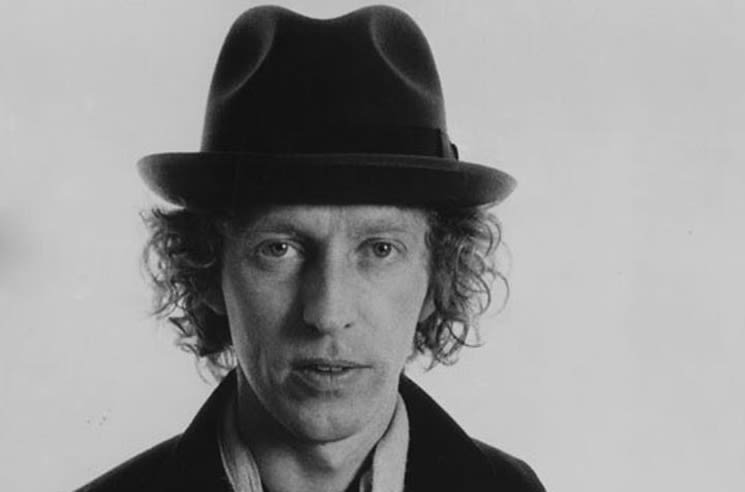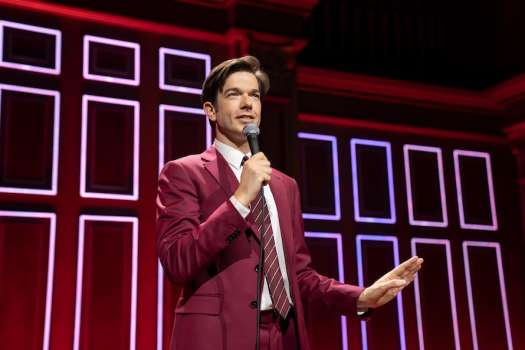Graeme Williamson —a co-founder and frontman of celebrated Toronto band Pukka Orchestra — has died. The group confirmed Williamson's passing on Facebook yesterday (June 25), writing that he died in Glasgow, Scotland, with his wife Iris at his side. A cause of death was not revealed.
The Scottish-born Williamson formed Pukka Orchestra in 1979 with Neil Chapman and Tony Duggan-Smith, taking the group name from a Hindu word meaning "first rate" or "genuine," reportedly after Duggan-Smith's mother complained he wasn't pursuing a 'real' musical career.
Pukka Orchestra would begin performing in venues along Queen Street West, often rounding out their live lineups with a host of area players. The trio would make their recording debut in 1981 with single "Rubber Girl," released through their own Rubber Records.
Local airplay of the single led to Pukka Orchestra signing to Neill Dixon and Steve Propas's Solid Gold Records ahead of releasing a self-titled full-length debut in 1984.
Lead single "Listen to the Radio" — a cover of the Tom Robinson and Peter Gabriel song the former recorded as Atmospherics — found chart success before album opener "Cherry Beach Express" would carve out a history all its own.
"Cherry Beach Express," which can be heard below, is anti-police brutality song that takes its title from reports of Toronto police taking people to the lakeside location to beat them up. Top cops moved to limit radio play of the single upon its release.
"I got a bone to pick with you / Not-so-friendly boys in blue," Williamson begins, name-checking the city's 52 Division before singing the chorus, "That's why I'm riding on the Cherry Beach Express / My ribs are broken and my face is in a mess / And a name on my statement's under duress."
In 1985, Pukka Orchestra captured a CASBY Award for Most Promising Band before their bright future was upended. Solid Gold Records would soon fold in spite of the band's success, and Williamson would develop kidney problems while visiting relatives in Scotland.
Williamson would remain in Scotland to receive dialysis treatment while Chapman, Duggan-Smith and Toronto's music community held benefit performances to raise money in support. He would later return to Canada and receive a kidney transplant, before rejoining Pukka Orchestra to release four-song EP The Palace of Memory through their own A Major Label.
Pukka Orchestra eventually broke up in 1988 before briefly returning with Dear Harry in 1992, a collection of rerecorded and previously unheard material. The band's self-titled debut would receive a reissue in 2000.
Outside of his work with Pukka Orchestra, Williamson was a fiction writer, and published a book titled Strange Faith in 2001.
The Scottish-born Williamson formed Pukka Orchestra in 1979 with Neil Chapman and Tony Duggan-Smith, taking the group name from a Hindu word meaning "first rate" or "genuine," reportedly after Duggan-Smith's mother complained he wasn't pursuing a 'real' musical career.
Pukka Orchestra would begin performing in venues along Queen Street West, often rounding out their live lineups with a host of area players. The trio would make their recording debut in 1981 with single "Rubber Girl," released through their own Rubber Records.
Local airplay of the single led to Pukka Orchestra signing to Neill Dixon and Steve Propas's Solid Gold Records ahead of releasing a self-titled full-length debut in 1984.
Lead single "Listen to the Radio" — a cover of the Tom Robinson and Peter Gabriel song the former recorded as Atmospherics — found chart success before album opener "Cherry Beach Express" would carve out a history all its own.
"Cherry Beach Express," which can be heard below, is anti-police brutality song that takes its title from reports of Toronto police taking people to the lakeside location to beat them up. Top cops moved to limit radio play of the single upon its release.
"I got a bone to pick with you / Not-so-friendly boys in blue," Williamson begins, name-checking the city's 52 Division before singing the chorus, "That's why I'm riding on the Cherry Beach Express / My ribs are broken and my face is in a mess / And a name on my statement's under duress."
In 1985, Pukka Orchestra captured a CASBY Award for Most Promising Band before their bright future was upended. Solid Gold Records would soon fold in spite of the band's success, and Williamson would develop kidney problems while visiting relatives in Scotland.
Williamson would remain in Scotland to receive dialysis treatment while Chapman, Duggan-Smith and Toronto's music community held benefit performances to raise money in support. He would later return to Canada and receive a kidney transplant, before rejoining Pukka Orchestra to release four-song EP The Palace of Memory through their own A Major Label.
Pukka Orchestra eventually broke up in 1988 before briefly returning with Dear Harry in 1992, a collection of rerecorded and previously unheard material. The band's self-titled debut would receive a reissue in 2000.
Outside of his work with Pukka Orchestra, Williamson was a fiction writer, and published a book titled Strange Faith in 2001.




